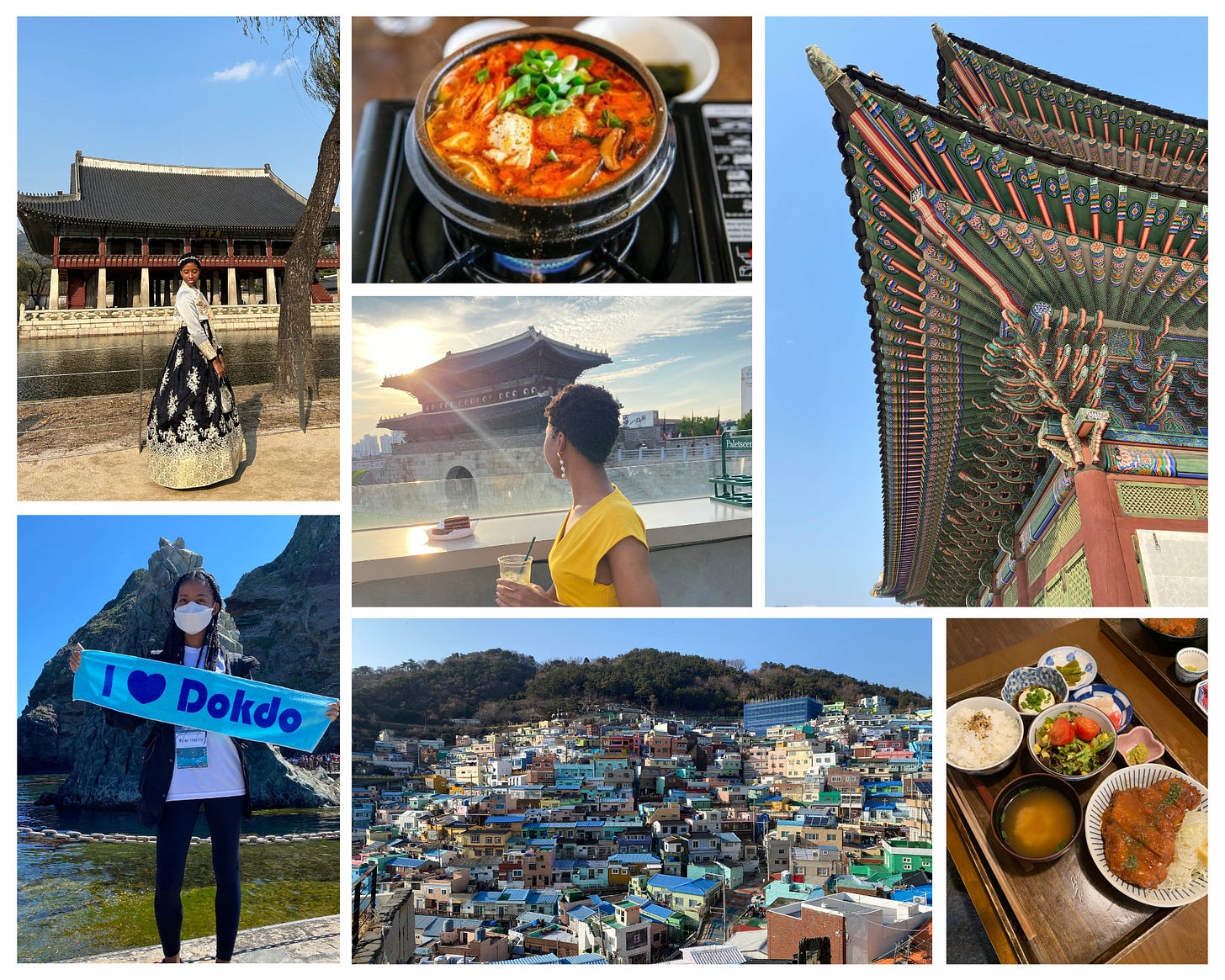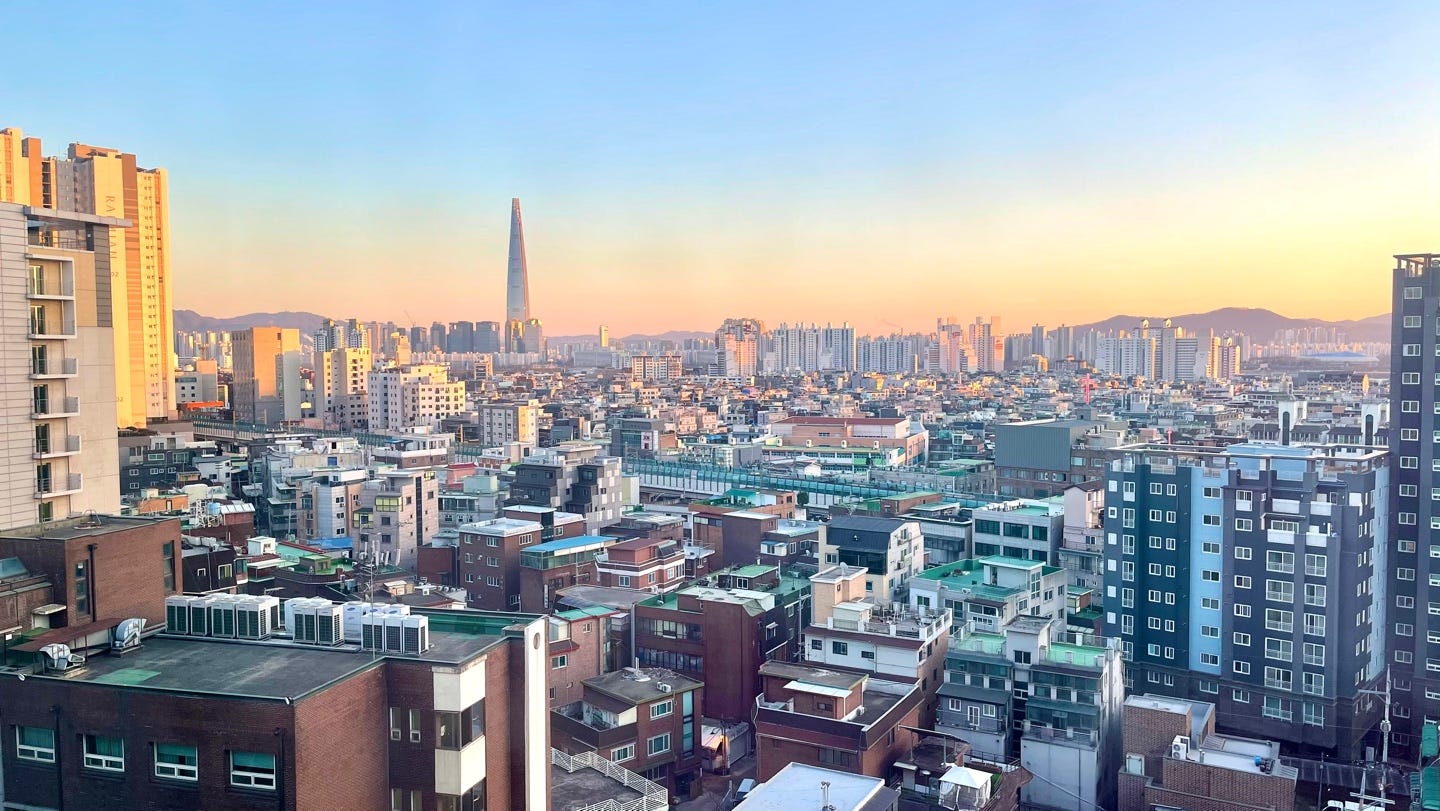My Three Years Abroad
What started as an obsession with K-dramas and K-pop ended with a journey of cultural and personal exploration. Buckle up, folks. This is a long one.
Welcome to Blaxplaining, a biweekly newsletter featuring reflections and notes from a Black woman navigating life. New issues will be released every other Friday at 9 AM EST. If you like this newsletter, make sure you subscribe and share it with your friends!
My three years in South Korea can be summed up in one word: humbling. There were some great experiences and some bad experiences, but I wouldn’t trade them for anything else. It’s pretty funny how my journey to Korea started. It was 2015. I suffered many devastating life changes, and my mental health was in shambles. I so happened to come across some K-pop and Korean dramas; the next thing I knew, it became my new personality. I wouldn’t say the exposure saved my life or anything, but it gave me a direction—a new sense of purpose. I was going to go to South Korea no matter what.
It took a few years (and a global pandemic), but I was working towards my goal. In my free time, I consumed Korean content, learned Korean, and studied for my certification to teach English abroad. But I didn’t want to get too ahead of myself. There was a prodding question in the back of my mind: is Korea even a friendly place for Black people? So I got on YouTube and found a few Black expat women’s accounts, and I was sold a dream! They all had a large community of friends, juicy love lives with their oppas (Korean word for addressing an older male, sometimes used in a romantic sense), and shared all the beautiful and fun sights to see. Only a few had terrible encounters and experiences with racism, but I was sold immediately.
Yes, in retrospect, I was admittedly naive and idealizing the country as a whole, but by the time it was time to depart, I went in with realistic expectations. Truly! I had no idea where I would work or stay or if I’d make friends; I was going in on a wing and a prayer. Luckily, my expectations weren’t too far off base: I had a great quality of life, I didn’t experience too much culture shock, I lived in beautiful cities (Gimcheon, Suwon, what’s up!), and I had a community of both natives and expats. I loved the culture, the history, and the food! However, I did take some losses. My work, health, and love life were a mess, and some more significant societal issues were at play, but it was all a part of the experience. And they all helped me learn more about myself and my place in the world.

One thing that truly affected me was seeing America from an outside lens. South Korea isn’t a utopia by any means, but I couldn’t understand why America couldn’t have nice things like affordable healthcare, a (mostly) accountable government, and efficient infrastructure. It was just the way of life there. It’s not like America can’t do the same, but we just don’t. Even the Covid response was astronomically different. There were mask mandates, community alerts, and free tests, and I never saw anyone complain about it. Everyone appeared to be working towards a common goal: to keep others safe. Seeing the opposite at home was jarring, though I should have known better. The concept of a community is not really an American thing.
Another wake-up call was being a Black woman in a homogenous country. I knew beforehand that I’d never truly fit in or meet South Korea’s unforgiving beauty standards, so one of my personal goals was to take up space as a Black woman and show pride in my own features. Although my skin color and natural hair stood out, I was mostly just seen as a foreigner. Like America, there were different rules that minorities had to play by, so I wasn’t surprised by a few microaggressions and double standards. Amid my students and coworkers, I didn’t want to present myself as a museum exhibit, but I did answer any questions and quickly called out any racist language and incidents. One of my students even called me a n*gger, but luckily, I had the support of the school to take serious action. There was also a sense of solidarity I felt with my Korean brethren. One was the similarities between Korean and African-American cuisine: great fried chicken, seasoned veggies, and Jokbal (pig’s feet)! Another was the concept of Han. Han is an essential part of Korean culture and can be described as “a mixture of sorrow and resentment but with tinges of hope within sadness and anger.” It was a perfect word to encapsulate many Black Americans' feelings about surviving in a country built on racism. When Koreans spoke about the injustices that they faced throughout history, I could only empathize with them and imagine the pain both of our ancestors might have felt.
The only reason I left Korea was because I needed to. With the amount of work I had, I couldn’t prioritize my health. I also felt stagnant. I loved teaching, but I couldn’t imagine doing it in such a capacity for a long time, and my visa wouldn’t allow me to change my career. I also missed being around others who looked like me. I am immensely grateful for my time and experiences in Korea, but it wasn’t a permanent home. I learned a lot about myself and what I want out of life, and I sincerely believe that I wouldn’t have if I didn’t have this opportunity. My advice to anyone, especially Black women, who wants to move abroad is to do it! Do the research, learn the language, have realistic expectations, be comfortable in your own skin, and make the best of it. I’m sure you’ll have the time of your life:)
Yay, you made it to the end! Please leave a comment if any of you had some incredible experiences abroad that you would like to share. As always, thanks for reading:)
x T.H.





Love itttt!! So proud of your growth & global expansion Tyler!! 💖✨
Thanks for sharing your wonderful experience💜